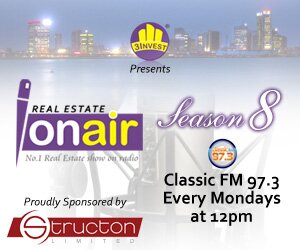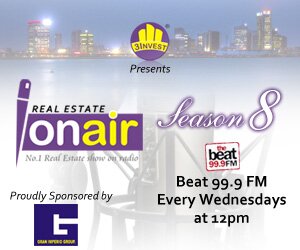Friday , 21 March 2014
Headlines
- Nigerian Economic Summit to focus on Education
- Construction of 2nd Niger Bridge kicks off
- Fraud Alert: Beware of Ayobo land – Lagos Land Bureau
- NIESV becomes govt official property valuers and managers – BPP
- AFC Hosts Inaugural Summit to Address the Scale of Africa’s Infrastructure Requirements and Investment Deficit
- Renewed Investor Confidence Evident at 25th MIPIM
- Ethel’s Place Oniru, now selling









UPDC reports 233% Profit Growth
The performance of UACN Property Development Company Plc for nine months ending 2013 showed an increase of 233 per cent in profits, raises hopes for higher dividends at the end of the year
Doing business in Nigeria is very challenging given the poor state of infrastructure and high cost of funding. While the country has a huge market for all products and services, high cost of operations always affect the profitability of many companies. As a result, few companies post profit growth that are above 100 per cent.
However, in the current earnings season covering the nine months ended September 30, 2013, some companies have reported bottomlines that raised investors’ hopes for high returns at the end of the financial year. One of such companies is UACN Property Development Company (UPDC) Plc. The company, last week, reported a growth of 233 per cent in profit before tax (PBT). But high tax provision reduced the growth in profit after tax (PAT) to 140 per cent, a performance still regarded as highly encouraging.
Corporate Profile
UPDC is into the business of acquisition, development, sales and management of high quality commercial and residential properties in the luxury, premium and classic segments of the real estate market in selected cities in Nigeria. It has become a leader in the real estate and property development space in the country.
Until 1998, UPDC was operating as the real estate/property division of UAC of Nigeria Plc. It was incorporated in October as a full-fledged company, commenced operations in April 1998 and got listed on the Nigerian Stock Exchange (NSE) in November 1999. UPDC is owned 46 per cent by UACN; 12 per cent by First Trustees Nigeria Limited and 18 per cent by other corporate bodies. Individuals and trustees hold the remaining 24 per cent.
The company has Mr. Larry Ettah, who is the Group Managing Director/Chief Executive Officer UACN, as chairman. Mr. Hakeem Ogunniran is the MD/CEO of the company while other directors include: Mrs. Folasade Ogunde; Mr. Abdul Bello; Dr. Ibrahim Mohammed; Mr. Olumide Oduntan; Mr. Babs Kasali and Mrs. Halima Alao.
UPDC’s vision is “to be the number one real estate company in our chosen markets, offering exceptional products and services to customers,” and mission of “to grow our top-line at twice the rate of Nigeria′ s GDP growth and achieve an average Earnings before interest and tax (EBIT) of 23 per cent.”
Financial Performance
Although UPDC recorded a PAT of 233 per cent for the nine months ended September 30, 2013, the company has had a relatively impressive financial track record over the years, punctuated by some fluctuation. The fluctuation notwithstanding, UPDC has been rewarding shareholders with dividend.
A breakdown of the company’s performance showed that turnover, which stood at N5.676 billion in 2007, rose to N13.328 billion in 2008 and climbed further to N13.331 billion in 2009. However, the turnover fell to N8.194 billion in 2010 before recovering back to N10.754 billion in 2011. The turnover grew to N12.039 billion in 2012.
In a similar pattern, PAT followed similar pattern of fluctuation, soaring from N425 million in 2007 to N3.683 billion in 2008. It fell to N2.828 billion in 2009. It declined marginally to N2.278 billion in 2010 before dipping further to N1.999 billion in 2011. However, PAT recovered to N2.78 billion in 2013.
Shareholders of UPDC have been consistently benefitting from cash dividend and bonus issues. For instance, shareholders received bonus shares in 2004 and 2010. They similarly received dividends of N536 million (49 kobo per share) in 2007; N825 million (75 kobo per share) in 2008; N550 million (50 kobo per share) in 2009; N756 million (55 kobo per share) in 2010, N893 million (65 kobo per share) in 2011 and N962million (70 kobo) in 2012.
Positioned for Better Performance
Despite the challenges and stiff competition in the industry and economy in general, Ettah said UPDC had been positioned to take advantage of the opportunities in the real estate sector.
Addressing shareholders of the company at the annual general meeting last June, Ettah said the real estate business had continued to be attractive with the huge housing deficit of about 17 million units and the growing population and emerging middle class.
“Partnership opportunities are also emerging across different segments of the market and your company is poised to take advantage of them,’’ he said.
According to him, in spite of the seeming glut in the luxury market, rents and sale prices for high-end apartments remained quite high while in the commercial segment, headline rents in Lagos ranked among the highest in the world.
“International operators continue to express a strong desire to expand their footprints in the Nigerian market, as significant demand/supply imbalance exists for quality hotel accommodation. The retail segment is primed for a major revolution with several mall developments under way in key metropolitan cities of Nigeria,’’ Ettah said.
He said the company had made significant progress in the area of building development including: the 55-unit Metro Gardens in Lekki and the 18-unit Grandville in GRA, Ikeja; the commencement of development of 90-unit Vintage Gardens, Port Harcourt and the remarkable progress recorded in the construction of the 32-unit Cameron Green luxury development in Ikoyi and Phase 1 of UPDC Metro City Dutse, Abuja.
N30 Billion REIT Capital Boost
UPDC boosted its operations early this year with the capital injection of N30 billion. That money was raised from investors through real estate investment trust (REIT).
A REIT is a scheme which typically owns and manages predominantly rent-generating commercial, retail or residential real estate (or combination) for the benefit of investors in the scheme.
Ettah had explained that the REIT offer would allow the company to raise enough financial firepower to develop some of the property assets which the company already has and some of its projects already in the pipeline.
According to him, the UPDC has existing projects in Abuja, Lagos and upcoming projects include: Metro Gardens, Lekki; Granville, G.R.A, Ikeja; Cameron Green, Ikoyi’ Victoria Mall Plaza, Victoria Island all in Lagos; Emerald Court, Apo, and Metro City, Apo in Abuja; and Emerald Court and Nigeria Air Force Foundation (NAFF) Estate in Port Harcourt, Rivers State.
Speaking in the same vein, Ogunniran had said REIT would fetch investors competitive yield returns from its disciplined investment approach.
“Investors also stand to minimise their risks as a result of property portfolio diversification as the REIT seeks to invest in other prime properties in Lagos, Abuja and other major cities in Nigeria to enhance its income generating property assets,” he said.
Nine Months Results
Going by the nine months results, the impact of the capital injection from the REIT may have begun to manifest. Revenue rose by 30 per cent to N10.1 billion from N7.8 billion in the corresponding period of 2012. PBT rose by 233 per cent to N2.893 billion from N869 million. PAT grew by 140 per cent from N800 million to N1.917 billion. The lower growth resulted from a higher tax rate in 2013, compared with the previous year. While UPDC paid a tax of N68 million in 2012, it rose by 132 per cent to N976 million in 2013.
Further analysis of the performance showed gross profit margin recorded impressive improvement, rising from 11 per cent to 29 per cent in 2013.
Given the higher tax payment, the net profit margin was 18 per cent.
Earnings per share stood at N1.40, compared with N0.57 the previous year, raising hopes that the investors may receive higher dividend at the end of the year.
Red Flags
Although UPDC recorded a growth of over 100 per cent in PAT, the growth in profit was driven by other income, which rose by 3,423 per cent from N54million to N1.905 million in 2013. The company also realised a gain of N445 million from the sale of investment property. Market analysts said these items portend a headwind for the company should it fails to record higher other income in the last quarter of the year and record another gain from the sale of investment property.
They added that UPDC needed to work on its operating expenditure so as to sustain the nine months results posted in the nine months. For instance, cost of sale increased by 43 per cent from N4.7 billion in 2012 to N6.8 billion in 2013. Financing charges equally rose by 40 per cent from N967 million to N1.348 billion, indicating that the company requires additional equity funding and reduce financial charges on bank loans. Current financial liabilities of stood at N19 billion as at September 30, 2013.
Related posts
Nigerian Economic Summit to focus on Education
March 19, 2014
Construction of 2nd Niger Bridge kicks off
March 17, 2014
Fraud Alert: Beware of Ayobo land – ...
March 17, 2014
NIESV becomes govt official property valuers and ...
March 17, 2014
Ethel’s Place Oniru, now selling
March 10, 2014
GTHomes rebrands to Imperial Homes
March 10, 2014